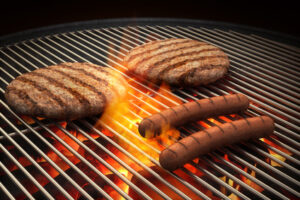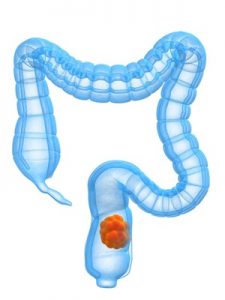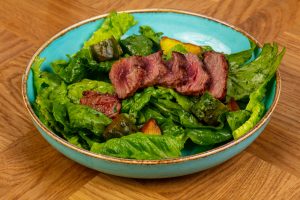How Can You Decrease Your Risk Of Colon Cancer?
Author: Dr. Stephen Chaney
 Both red meat and processed meat consumption are associated with increased risk of colon cancer. But the strength of that association differs between the two.
Both red meat and processed meat consumption are associated with increased risk of colon cancer. But the strength of that association differs between the two.
Processed meat has been classified as a carcinogen by the IARC*, indicating the evidence that processed meat causes colon cancer is definitive. Red meat, on the other hand, has been classified as a probable carcinogen by the IARC*. That means the evidence that red meat causes colon cancer is strong, but not definitive.
*[In case you were wondering, the IARC (International Agency for Research on Cancer) is an international agency charged by the WHO to, among other things, determine the risk of cancer from various foods, industrial chemicals, and environmental pollutants.]
As I said above, red meat consumption is associated with increased risk of colon cancer. But…
- Not all studies agree (more about that later), and…
- Association doesn’t prove cause and effect. It could be some other characteristic of red meat eaters that increases their risk of colon cancer.
- Until recently we had no clear idea of how red meat might cause colon cancer.
Several mechanisms have been proposed. I will discuss each mechanism and ways to reduce the risk of colon cancer by that mechanism:
#1: When fat and juices from the meat drip onto an open flame, carcinogenic polyaromatic hydrocarbons (PAHs)  are formed that stick to the surface of the meat. PAHs can be metabolized to cancer causing chemicals in our body.
are formed that stick to the surface of the meat. PAHs can be metabolized to cancer causing chemicals in our body.
- PAH formation can be reduced by marinating the meat prior to cooking or by using cooking techniques that don’t involve an open flame.
- PAH formation can be reduced, but not eliminated, by lower fat meat choices, such as grass-fed beef.
- High fiber diets reduce exposure to PAHs by binding to them and flushing them through the intestine.
- Cruciferous vegetables block the conversion of PAHs to cancer causing chemicals in our body.
#2: When red meats are cooked at high temperatures, amino acids in the meat combine with creatine, which is found in all red meats, to form heterocyclic amines (HCAs). HCAs can also be metabolized to cancer causing chemicals in our body.
- HCA formation can be reduced by cooking the meat at lower temperatures.
- Grass-fed beef does not reduce HCA formation because this mechanism is not dependent on the fat content of the meat.
- High fiber diets and cruciferous vegetables reduce the danger of HCAs by the same mechanisms as for PAHs.
#3: The nitrates and nitrites used as preservatives in many processed meats react with amino acids from the meat to form carcinogenic N-nitrosamines in our intestines.
- Antioxidant-rich fruits and vegetables can divert nitrates and nitrites into an alternative pathway that coverts them into nitric oxide, which is beneficial to our bodies. I have discussed this in a previous issue of “Health Tips From the Professor”.
#4: Heme, which is found in all red meats, combines with amino acids in the meat to form carcinogenic N-nitrosamines and similar N-nitroso compounds in our intestines.
- This mechanism is inherent in all red meats and cannot be eliminated by choosing grass-fed beef or cooking at lower temperatures.
- The formation of N-nitroso compounds from red meat appears to be carried out by gut bacteria. We know that meat eaters and vegetarians have very different populations of gut bacteria, but we don’t know whether this influences N-nitroso formation.
Mechanism #4 (formation of N-nitroso compounds from heme-containing red meat in our intestines) is the one I will be discussing in this article. But first, it’s time for Metabolism 101.
Metabolism 101: Why Should We Fear N-Nitroso Compounds?
 Simply put, N-nitroso compounds react with our DNA. They transfer methyl and ethyl groups to the nucleotides that make up our DNA sequence. The general term for these reactions is alkylation of the DNA.
Simply put, N-nitroso compounds react with our DNA. They transfer methyl and ethyl groups to the nucleotides that make up our DNA sequence. The general term for these reactions is alkylation of the DNA.
- In some cases, this causes the alkylated nucleotides to miscode during DNA replication. This can lead to cancer causing mutations.
- In other cases, this causes genes to be permanently turned on or off.
To understand why this is a problem, you need to know a bit about cancer cell biology.
- We have certain genes called “oncogenes”. These are genes that turn on processes like cell division. Normally these genes are tightly regulated so that cell division only occurs when it is needed. When these genes are permanently turned on, unregulated, continuous cell division occurs. In short, the cell becomes a cancer cell.
- We have other genes called “tumor suppressor genes”. These are genes that do things like shutting down cell division when it is not needed. When these genes are permanently turned off, unregulated cell division can occur.
With this in mind, let us review what we know about red meat and colon cancer:
- Red meat consumption is associated with increased risk of colon cancer.
- Red meat consumption is also associated with increased concentrations of N-nitroso compounds in the colon. Studies also show:
- The formation of N-nitroso compounds correlates with the heme content of the meat.
- The formation of N-nitroso compounds in the colon is dependent on certain strains of gut bacteria.
- The formation of N-nitroso compounds is reduced by diets high in fiber. It is likely this is because high fiber diets influence the types of bacteria in the colon, but that has not been proven yet.
What is missing is evidence that colon cancer cells contain the kind of DNA modifications (DNA alkylation) caused by N-nitroso compounds. That is what the current study (C Gurjao et al, Cancer Discovery, published online June 17, 2021) was designed to test.
How Was This Study Done?
 One reason previous studies had not been able to demonstrate a clear correlation between red meat consumption and DNA modifications was that the studies were too small to obtain statistically significant results.
One reason previous studies had not been able to demonstrate a clear correlation between red meat consumption and DNA modifications was that the studies were too small to obtain statistically significant results.
So, the authors of this study combined data from women in the Nurses’ Health Study, the Nurses’ Health Study II, and men in the Health Professionals Follow-Up Study. There were over 238,130 women and 51,529 men in these three studies.
None of the participants had cancer at the time they entered the studies. The participants were followed for at least 27 years. During that time 4855 participants developed colon cancer.
At the beginning of each study and every 4 years later the participants were asked to fill out a food frequency questionnaire to collect information about their usual diet over the past year. Validation studies showed that the diets of the participants changed little over the interval of the studies.
The participants in these studies were sent follow-up questionnaires every two years to collect information on lifestyle and newly diagnosed diseases like colon cancer.
For those who developed colon cancer, their medical records were reviewed to collect data on tumor size, tumor location, and disease stage.
The diagnoses of colon cancer often involves removing tissue from the cancer and from surrounding normal tissue and putting it in formalin-fixed paraffin-embedded tissue blocks. These were collected, and the DNA was extracted and sequenced to determine the extent and genetic location of alkylated DNA sequences.
How Does Red Meat Cause Colon Cancer?
 This study measured the effect of red meat consumption on the extent and location of what the authors called “alkylation signatures”, which refers to the kinds of DNA modifications caused by N-nitroso compounds. Here is what they found:
This study measured the effect of red meat consumption on the extent and location of what the authors called “alkylation signatures”, which refers to the kinds of DNA modifications caused by N-nitroso compounds. Here is what they found:
- Red meat consumption was positively associated with an increase in alkylation signatures caused by N-nitroso compounds in tumor tissue from patients with colon cancer.
-
- This was true for both processed and unprocessed red meat.
-
- There was no difference between men and women after adjusting for differences in red meat intake.
-
- White meat (chicken and fish) did not cause an increase in alkylation damage in colon cells.
- More importantly, there was an inverse association between alkylation damage in the tumor tissue and patient survival. Simply put, high levels of alkylation damage were associated with short survival times.
Previous studies have shown that processed red meat consumption was associated with increased levels of N-nitroso compounds and an increased risk of colon cancer in the distal colon.
- This study showed colon cancer patients who had been consuming processed red meats had higher alkylation damage in tumors in the distal colon.
Previous studies have shown that certain oncogenes (genes that drive the conversion of normal cells to cancer cells) are activated in colon cancer cells and this activation is associated with alkylation damage to their DNA.
- This study showed that tumors with activated oncogenes were enriched with the alkylation signature characteristic of N-nitroso compounds.
I realize this study is highly technical. It is not easy to understand, so let me simplify it.
- Previous studies have shown that red meat consumption is associated with an increased risk of colon cancer.
- Previous studies have also shown that red meat consumption is associated with an increased concentration of carcinogenic N-nitroso compounds in the colon.
- This study shows that red meat consumption is associated with the kind of DNA damage caused by N-nitroso compounds in colon tumor cells. More importantly, this is the kind of damage that can lead to cancer-causing mutations. In addition:
-
- The DNA damage occurs in the exact location of the colon predicted from earlier studies.
-
- The DNA damage occurs in genes known to drive the conversion of normal colon cells to cancer cells.
In short, this study provides a plausible mechanism for the effect of red meat consumption on increased risk of colon cancer. It shows how red meat can cause colon cancer.
“In the words of the authors, “Our study has leveraged a comprehensive dataset with repeated dietary measures over years…and [DNA sequencing] on a large collection of colorectal tumors. It provides unique evidence supporting the direct impact of dietary behaviors on colorectal carcinogenesis…”
How Can You Decrease Your Risk Of Colon Cancer?
 When this study is combined with previous studies, it provides a clear explanation of how red and processed meats can cause colon cancer. And, unfortunately, grass-fed beef is not a “Get Out Of Jail Free” card. This mechanism is equally applicable to grass-fed beef and conventionally raised beef.
When this study is combined with previous studies, it provides a clear explanation of how red and processed meats can cause colon cancer. And, unfortunately, grass-fed beef is not a “Get Out Of Jail Free” card. This mechanism is equally applicable to grass-fed beef and conventionally raised beef.
Does this mean you need to become a vegan? While I have nothing against veganism, the answer appears to be no. As I discussed above whole, unprocessed plant foods are the antidote to the carcinogenic compounds formed from red meat. This is due to:
- Their fiber, which sweeps some carcinogens out of the intestine before they can be absorbed.
- Their antioxidants, which prevent some carcinogens from being formed.
- Their phytonutrients, which block the activation of some carcinogens.
- The friendly gut bacteria they support, which displace the bad bacteria that form some carcinogen precursors in the intestine.
The good news is that some red meat may be OK in the context of a primarily plant-based diet. For example, 3 ounces of red meat in a green salad or stir fry is less likely to increase your risk of colon cancer than an 8-ounce steak and fries.
The bad news is this is why not all studies have shown an association of red meat consumption and increased risk of colon cancer. Unfortunately, far too many of these studies have ignored other components of the diet.
The Bottom Line
A recent study looked at the effect of red meat consumption on DNA modifications in colon cells that are associated with the conversion of normal cells to cancer cells. It is a highly technical study, but the simplified version is:
- Previous studies have shown that red meat consumption is associated with an increased risk of colon cancer.
- Studies have also shown that red meat consumption is associated with an increased concentration of carcinogenic N-nitroso compounds in the colon.
- This study shows that red meat consumption is associated with the kind of DNA damage caused by N-nitroso compounds in colon tumor cells – the kind of damage that can lead to cancer-causing mutations. In addition:
-
- The DNA damage occurs in the exact location of the colon predicted from earlier studies.
-
- The DNA damage occurs in genes known to drive the conversion of normal colon cells to cancer cells.
In short, this study provides a plausible mechanism for the effect of red meat consumption on increased risk of colon cancer. It shows how red meat can cause colon cancer.
“In the words of the authors, “Our study has leveraged a comprehensive dataset with repeated dietary measures over years…and [DNA sequencing] on a large collection of colorectal tumors. It provides unique evidence supporting the direct impact of dietary behaviors on colorectal carcinogenesis…”
For more details about this study and how you can eat red meat and still reduce your risk of colon cancer, read the article above.
These statements have not been evaluated by the Food and Drug Administration. This information is not intended to diagnose, treat, cure, or prevent any disease.
